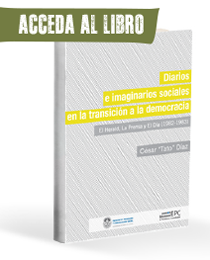The press in times of the Cisplatina Province. El Pacífico Oriental de Montevideo and the echoes of the Portuguese constitutionalism in the Río de la Plata
Keywords:
press, freedom, public opinion, Cisplatina ProvinceAbstract
This article describes a journalistic experience which emerged in Montevideo (Uruguay) during the Luso-Brazilian annexation, in a context of social changes and political language transformation. Revolutions, wars and the emergence of liberal movements in the Iberian Peninsula helped accelerate these processes. The study of El Pacífico Oriental de Montevideo and the difficulties faced by its editor allows us to know more about the debates about freedom, liberty and the importance of public opinion in the 1820s.
Downloads
Published
How to Cite
Issue
Section
License
The acceptance of an original by the journal implies the non-exclusive transfer of the patrimonial rights of the authors in favor of the publisher, who allows the reuse, after its edition (postprint), under a Creative Commons License Attribution-NonCommercial-ShareAlike 4.0 International.
According to these terms, the material can be shared (copy and redistribute in any medium or format) and adapted (remix, transform and create another work from the material), provided that a) the authorship and the original source of their publication (magazine and URL of the work) are cited, b) is not used for commercial purposes and c) the same terms of the license are maintained.
The assignment of non-exclusive rights implies that after postprint in IMPRONTAS de la historia y la comunicación authors may publish their work in any language, media and format; in that case, it is requested that they signal that the material was originally published by this journal.
Assignment also entails the authors’ authorization for the work to be collected by SEDICI, the institutional repository of the Universidad Nacional de La Plata, and for it to be indexed in the databases that the publisher thinks appropriate for enhancing the visibility of the published work and its authors.
In addition, the journal encourages authors to submit their works to other institutional and thematic repositories after their publication in IMPRONTAS de la historia y la comunicación, under the assumption that offering society unrestricted access to scientific and academic production contributes to a greater exchange in global knowledge.






.jpg)


.png)


.png)


















